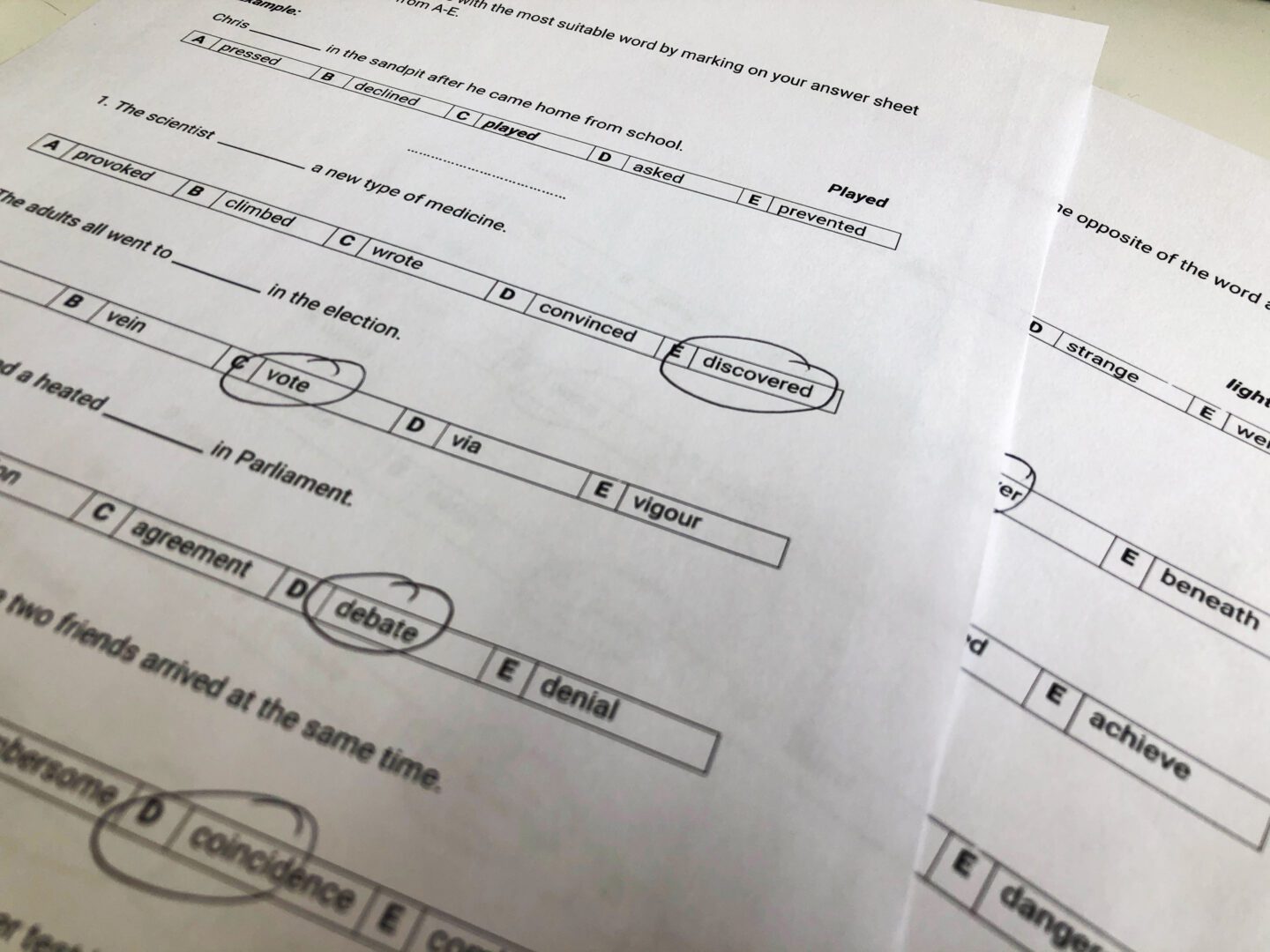
The Exam
With over 40 years of experience, we understand the demands of the exam, and what each school is looking for.
What is on the 11 Plus Verbal Reasoning Exam?
What is on the Verbal Reasoning syllabus and how can you prepare your child for the exam? Read on for everything you need to know and our top tips.
Verbal Reasoning is arguably the most important aspect of the 11 Plus exam. Schools correlate Verbal Reasoning very strongly with academic potential and are looking for children who can solve verbal reasoning puzzles with a high degree of accuracy and speed.
In fact, some schools believe this aspect is so important that they only test Reasoning in their entrance exams, particularly some Grammar schools. Other, mainly Independent schools set a Pre test which is purely Reasoning based and use this to make a large cut in their applicants, typically losing 50% of candidates at this stage. It is therefore essential that any families on their school entrance journey take Verbal Reasoning seriously and give their child enough time to learn all the question types and practice sufficiently.
What is Verbal Reasoning?
Verbal reasoning is the ability to understand and logically work through concepts and problems expressed in words. The tests tell schools how well a pupil can extract and work with meaning, information and implications from text.
Verbal reasoning is a test of skill rather than learned knowledge. It assesses children’s critical thinking skills as well as their ability to apply their knowledge to solve word problems.
Parents are often surprised that Verbal Reasoning tests usually include cracking number codes and completing number sequences. This is because the logic problem is expressed verbally, not numerically. There can be some hard Maths on the Verbal Reasoning papers, including square and cube numbers and algebra.
Verbal Reasoning also tests a child’s understanding of the complexity and nuance of language. It is definitely a topic where it is useful to identify whether your child is sitting a CEM or a GL Assessment as the questions are different in style and lend themselves to different resources. We can advise you here.
Can Verbal Reasoning be taught? I’ve heard it is “tutor-proof”.
There is no doubt that schools believe that Verbal Reasoning is quite a ‘pure’ test of innate ability. It is also true that parents and tutors are less able to influence success, compared to say, helping their child memorise stories for their creative writing tests.

However, some parents believe that they cannot help their child improve at all. This is absolutely not the case! Although your child will start with a natural affinity for the subject, there are a finite number of types of Verbal Reasoning questions and it is easy to practice and improve on them all if you start early and work systematically.
We believe that there is an uplift of 10-12% in terms of scoring available from learning how to approach each type of question and practising. A further 10-15% uplift is available if your child can develop speed of collecting up to 1 mark per minute. We cannot stress enough how important speed is in terms of succeeding at Verbal Reasoning exams. A typical Verbal Reasoning test will consist of 60 questions in 1 hour. No matter what proportion of the questions your child solves correctly, they will not pass the test if they only get to question 40.
Types of Verbal Reasoning Questions
Here are some important types of Verbal Reasoning questions, which you should check your child knows how to approach and has practised. It is by no means an exhaustive list however, and you should always research the type of Reasoning questions that your target schools prefer. There are usually past papers on school websites and many further resources online. Our range of Verbal Reasoning practice papers also covers all question types.
Sequences
- Numerical sequences
- Square and cube numbers
- Letter sequences
- Letter connections
- Letter-word codes
- Alphabet reflections
Code Breaking
- Number-word codes
Making up words
- Using rules to make up words
- Word ladders
Logic puzzles
- Fact puzzles
- Logic puzzles
CEM and GL Assessment
CEM and GL Assessment are the two main examining boards for both state school entrance exams and Independent school 11+ Pre-tests. Verbal Reasoning is the test that varies most widely between the two boards and it is vital that parents identify which type of test their child will sit and buys the correct practice resources.
CEM is perceived to be the more difficult of the two papers as it is designed to be ‘tutor-proof’ and CEM do not produce or endorse any sample material. The CEM tests change from year to year more than GL tests. In addition, more of the National Curriculum Key Stage 2 English skills are pulled into the CEM Verbal Reasoning syllabus including comprehension and much more vocabulary testing.
A pupil facing a CEM Verbal Reasoning test will need to have a deep and broad vocabulary.
GL Verbal Reasoning tests are favoured by many Grammar schools and are considered quite old fashioned. There are many GL endorsed Verbal Reasoning resources to help you practice.
Both CEM and GL Verbal Reasoning tests are very time pressured.
How can I help my child develop their Verbal Reasoning skills?
By far the best long-term preparation for Verbal Reasoning success is to create a daily reading habit with your child. There is an urban myth about the that states that children who pass know 10,000 more words than children who do not pass and we believe there is some underlying truth to this. Vocabulary acquisition is a slow process that cannot be crammed into a few months at the end of Year 5. You can also:
- Play word-based board games such as ‘Scrabble’ and ‘Boggle’ with your child.
- Play hangman, crosswords, word searches and Letris with your child. (There are some great free apps of these games available on tablets.)
- Concentrate on their spelling each week for school tests.
- Help them have a solid understanding of common grammatical problems such as the difference between ‘there’, ‘they’re’ and ‘their’.
- Encourage them to take their Verbal Reasoning practise slowly at first when they are learning how to approach the questions and concentrate on speed only when their knowledge is secure. It is very important that children read the question carefully.
- From the Summer holidays of Year 5 practice Verbal and Non-Verbal reasoning every day. Bond 10 minute test books are perfect for this. A little bit and often works best.
How can we help?
Here at Mentor Education, we specialise in school admissions, in particular the 11+. Our results speak for themselves, with 90% of our 2020 cohort achieving their first-choice school in 2021 and 100% receiving an offer from their first or second choice school.
The key to this success is our annual school entrance programme that builds each year, from January of Year 5 to the January of Year 6, encompassing the whole syllabus, across all disciplines tested in the exams themselves, exam technique and question practice. This allows young children to develop at an appropriate pace, with no element of cramming. We see your journey in three distinct phases and have organised our work to support you at each of these.
Our School Entrance Co-ordinator
One of the main advantages of working with Mentor Education is that we can coordinate your whole 11+ journey. Our dedicated Co-ordinator works full time to get to know you, your child and your aspirations and can flex our services to reflect what you need at any point in your journey.
If you don’t know where to start or if your child is a good candidate for the exam, our School Entrance Coordinator can arrange an academic assessment brimming with data points to help you make decisions, target schools and focus tuition only on where your child needs it.
If your child’s needs change throughout the year, we can swap out a general tutor, bringing in Reasoning experts or Scholarship experts as needed.
Essentially, their job is to stay close to your journey and assist every step of the way.
Specialist Reasoning Tuition

We have specialist school entrance tutors, who understand in great detail the Reasoning tests set by each of the schools they prepare pupils for. These can change year by year and our exam tutors are always up to date with the latest knowledge. For example, many schools are increasing their proportion of Spatial Reasoning questions and this is a trend we see across the London Independent Sector. Our tutors can help.
Get in Touch
We have plenty of information and top tips on the exam. Get in touch with our team today to find out more about how we can help.
London’s No.1 tuition agency
“For more than 35 years they have been helping students achieve places at the top London day and boarding schools.”